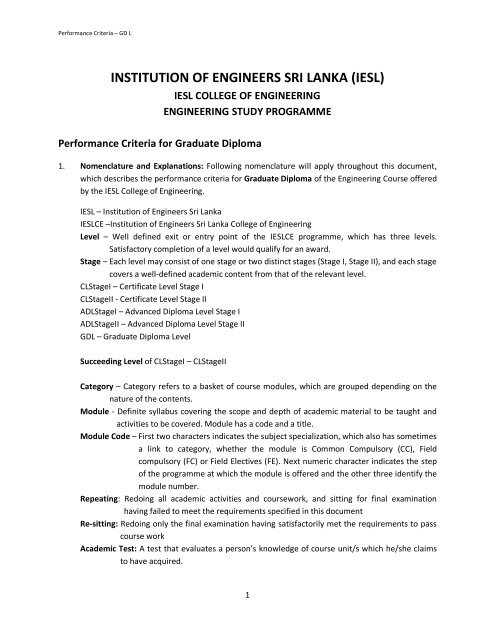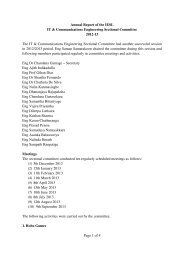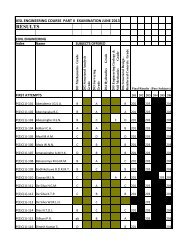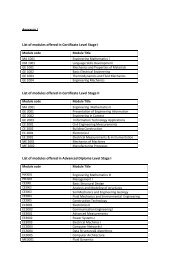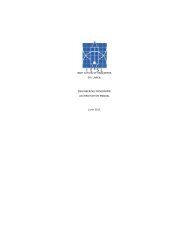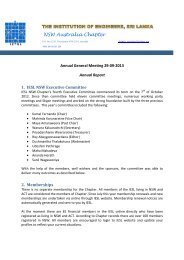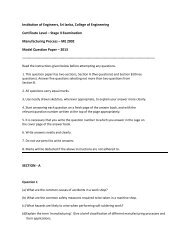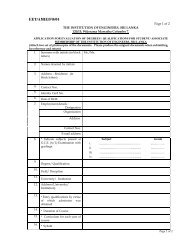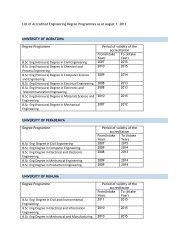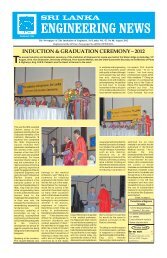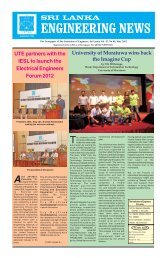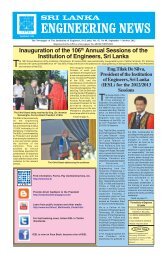Performance Criteria GDL (4) (2)-revised.pdf - IESL e-Learning System
Performance Criteria GDL (4) (2)-revised.pdf - IESL e-Learning System
Performance Criteria GDL (4) (2)-revised.pdf - IESL e-Learning System
You also want an ePaper? Increase the reach of your titles
YUMPU automatically turns print PDFs into web optimized ePapers that Google loves.
<strong>Performance</strong> <strong>Criteria</strong> – GD L<br />
INSTITUTION OF ENGINEERS SRI LANKA (<strong>IESL</strong>)<br />
<strong>IESL</strong> COLLEGE OF ENGINEERING<br />
ENGINEERING STUDY PROGRAMME<br />
<strong>Performance</strong> <strong>Criteria</strong> for Graduate Diploma<br />
1. Nomenclature and Explanations: Following nomenclature will apply throughout this document,<br />
which describes the performance criteria for Graduate Diploma of the Engineering Course offered<br />
by the <strong>IESL</strong> College of Engineering.<br />
<strong>IESL</strong> – Institution of Engineers Sri Lanka<br />
<strong>IESL</strong>CE –Institution of Engineers Sri Lanka College of Engineering<br />
Level – Well defined exit or entry point of the <strong>IESL</strong>CE programme, which has three levels.<br />
Satisfactory completion of a level would qualify for an award.<br />
Stage – Each level may consist of one stage or two distinct stages (Stage I, Stage II), and each stage<br />
covers a well-defined academic content from that of the relevant level.<br />
CLStageI – Certificate Level Stage I<br />
CLStageII - Certificate Level Stage II<br />
ADLStageI – Advanced Diploma Level Stage I<br />
ADLStageII – Advanced Diploma Level Stage II<br />
<strong>GDL</strong> – Graduate Diploma Level<br />
Succeeding Level of CLStageI – CLStageII<br />
Category – Category refers to a basket of course modules, which are grouped depending on the<br />
nature of the contents.<br />
Module - Definite syllabus covering the scope and depth of academic material to be taught and<br />
activities to be covered. Module has a code and a title.<br />
Module Code – First two characters indicates the subject specialization, which also has sometimes<br />
a link to category, whether the module is Common Compulsory (CC), Field<br />
compulsory (FC) or Field Electives (FE). Next numeric character indicates the step<br />
of the programme at which the module is offered and the other three identify the<br />
module number.<br />
Repeating: Redoing all academic activities and coursework, and sitting for final examination<br />
having failed to meet the requirements specified in this document<br />
Re-sitting: Redoing only the final examination having satisfactorily met the requirements to pass<br />
course work<br />
Academic Test: A test that evaluates a person’s knowledge of course unit/s which he/she claims<br />
to have acquired.<br />
1
<strong>Performance</strong> <strong>Criteria</strong> – GD L<br />
Programme Step: The study programme has minimum five years of studies and each year of study<br />
is a programme step<br />
Credit: A credit is defined as fifteen (15) hours of face-to-face lectures, or thirty (30) hours of<br />
coursework, or any combination of the two<br />
For example, if a given module has a credit load of 4, it can be 60 lecture hours, or 45<br />
lecture hours together with 30 hours related to activities contributed towards course work<br />
of that module, or any other combination of these two (lectures and coursework)<br />
depending on the nature of that module.<br />
Grade Point Average (GPA) : ∑ ∑<br />
, where<br />
n = 1, 2, …… 8 and n is number of course modules offered, x i is the credit load of a course<br />
module and k i is the relevant grade point. GPA is calculated for each and every level.<br />
Cumulative Grade Point Average (CGPA): ∑ ∑<br />
∑ ∑<br />
, where<br />
m is the number that denotes the programme step, where the current GPA is calculated.<br />
m=
<strong>Performance</strong> <strong>Criteria</strong> – GD L<br />
c) <strong>IESL</strong> Engineering course Part II with satisfying all subjects securing minimum D grade in each<br />
with relevant practical components.<br />
or<br />
d) Any other equivalent qualification accepted by the Academic and Management Committee of<br />
the College of Engineering after an evaluation of the qualification.<br />
Category a) does not consider completion of Industrial Training course module at the time<br />
of registration to <strong>GDL</strong>, but it should be completed before sitting final examination of<br />
Graduate Diploma level. It does consider the Group Project.<br />
(*Refer to special note at the end of this document)<br />
3. Award of the qualification, “Engineering Graduate Diploma”<br />
Graduate Diploma is the final exit point of the Engineering Programme of the <strong>IESL</strong> College of<br />
Engineering, and the qualification of “Engineering Graduate Diploma” will be awarded to those<br />
who<br />
a) Complete both CLStageI and CLStageII satisfying forty eight (48) credits, and<br />
b) Complete both ADLStageI and ADLStageII satisfying fifty six (56) credits with six (06) NGPA<br />
credits, and<br />
c) Complete <strong>GDL</strong> satisfying thirty two (32) credits including all Field compulsory (FC) modules.<br />
or<br />
d) Satisfying minimum thirty two (32) credits at Graduate Diploma Level when registration to the<br />
<strong>GDL</strong> is through lateral entry at this level.<br />
4. Fields of Specialization and Selection of Modules of <strong>GDL</strong><br />
a) The registrants to <strong>GDL</strong> should have chosen their field of specialization at CLStageII and<br />
continued to study in the same field of specialization through stages of Advance Diploma level<br />
without a change.<br />
b) The course modules at <strong>GDL</strong> shall be selected according to the course modules listed in Table<br />
01 discipline wise.<br />
c) The major field of specializations has codes with following identification:<br />
<br />
<br />
<br />
<br />
Civil Engineering – CE<br />
Electrical Engineering–EE and EC<br />
Electronics, Communication &Computer engineering – EE and EC<br />
Mechanical Engineering– ME<br />
3
<strong>Performance</strong> <strong>Criteria</strong> – GD L<br />
d) Modules with codes starting with MN and HM have two modules totaling up to eight (08)<br />
credits they are Field Compulsory (FC) modules. The rest of the modules are either Field<br />
Compulsory (FC) or Field Electives (FE).<br />
Refer to Table 2 for the list of modules with relevant credit loads.<br />
Curriculum –Engineering Graduate Diploma Level –Table 1<br />
Engineering<br />
Graduate<br />
Diploma Level<br />
Field of Specialization<br />
Category Credit Load Civil Electrical<br />
GPA NGPA Engineering Engineering<br />
FC<br />
FE<br />
4.0<br />
4.0<br />
4.0<br />
4.0<br />
4.0<br />
4.0<br />
4.0<br />
4.0<br />
4.0<br />
4.0<br />
4.0<br />
4.0<br />
4.0<br />
4.0<br />
4.0<br />
4.0<br />
MN5001<br />
HM5001<br />
CE5010<br />
MN5001 CC 4.0 Management III<br />
HM5001 CC 4.0 Humanities II<br />
MA5001 CC 4.0 Engineering Mathematics IV<br />
CE5001 FC 4.0 Structural steel design<br />
CE5002 FC 4.0 Computational Mechanics<br />
CE5003 FC 4.0 Irrigation Engineering<br />
4<br />
MN5001<br />
HM5001<br />
EE5002<br />
EE5003<br />
EE5004<br />
EE5005<br />
Electronics/Comp<br />
uter/Telecom.<br />
Engineering<br />
MN5001<br />
HM5001<br />
EC5010<br />
Mechanical<br />
Engineering<br />
MN5001<br />
HM5001<br />
ME5001<br />
ME5002<br />
ME5003<br />
ME5004<br />
ME5010<br />
Minimum Minimum Minimum 5 from Minimum<br />
5 from<br />
MA5001<br />
CE5001<br />
CE5002<br />
CE5003<br />
CE5004<br />
CE5005<br />
CE5006<br />
CE5007<br />
2 from<br />
MA5001<br />
EC4003<br />
EC5001<br />
EC5004<br />
EE5001<br />
MA5001<br />
EC5001<br />
EC5002<br />
EC5003<br />
EC5004<br />
EC5005<br />
EC5006<br />
EC5007<br />
EC5008<br />
1 from<br />
MA5001<br />
ME5005<br />
ME5006<br />
ME5007<br />
EE5001<br />
Total Credits 32 _<br />
Including Field Compulsory with other course modules a total of thirty two (32) credits shall be satisfied securing a minimum of D<br />
grade for each course module to award of Engineering Graduate Diploma.<br />
Table 02 : Module code, module title and credit load .<br />
Course<br />
code<br />
Category<br />
Credit<br />
load<br />
Title of the Modules
<strong>Performance</strong> <strong>Criteria</strong> – GD L<br />
CE5004 FC 4.0 Highway and Traffic Engineering<br />
CE5005 FC 4.0 Advanced Structural Design<br />
CE5006 FC 4.0 Concrete Technology<br />
CE5007 FC 4.0 Coastal and Port Engineering<br />
CE5010 FC 4.0 Individual Project<br />
EC4003 FC 4.0 Operating <strong>System</strong>s I<br />
EC5001 FC 4.0 Embedded <strong>System</strong>s<br />
EC5004 FC 4.0 <strong>System</strong> Design and Administration<br />
EE5001 FE 4.0 Control <strong>System</strong>s II<br />
EE5002 FE 4.0 High Voltage Engineering<br />
EE5003 FE 4.0 Energy <strong>System</strong>s<br />
EE5004 FE 4.0 Power Electronics<br />
EE5005 FE 4.0 Individual Project<br />
EC5002 FE 4.0 Communication <strong>System</strong>s<br />
EC5003 FE 4.0 Digital Signal Processing<br />
EC5005 FE 4.0 Software Engineering<br />
EC5006 FE 4.0 Database Management <strong>System</strong>s<br />
EC5007 FE 4.0 Computer Security<br />
EC5008 FE 4.0 Operating <strong>System</strong>s II<br />
EC5010 FE 4.0 Individual Project<br />
ME5001 FE 4.0 Automobile Engineering<br />
ME5002 FE 4.0 Advanced Manufacturing <strong>System</strong>s<br />
ME5003 FE 4.0 Product Design<br />
ME5004 FE 4.0 Industrial Engineering<br />
ME5005 FE 4.0 Refrigeration and Air Conditioning<br />
ME5006 FE 4.0 Heat Transfer<br />
ME5007 FE 4.0 Mechatronics<br />
ME5010 FE 4.0 Individual Project<br />
5. Assessment<br />
a) Each module is assessed separately. An assessment of each module consists of the following components:<br />
<br />
<br />
Formal Examination – Three (03) hour question paper, except for some with four (04) hour<br />
duration.<br />
Coursework –Continuously assessed during the academic year. Refer to item 1 above for the list<br />
of coursework components.<br />
Unless otherwise specified and made known to the student, minimum pass mark of the<br />
examination, and that of any component of course work and pass mark of coursework as a whole<br />
shall be minimum 40%<br />
b) Assessment of a module is completed only when both examination mark and coursework mark of that<br />
module are calculated and approved by the appropriate authority.<br />
5
<strong>Performance</strong> <strong>Criteria</strong> – GD L<br />
c) It is necessary that all components of coursework under a module be satisfactorily completed and<br />
assessed before the final examination as scheduled by the Secretariat of the <strong>IESL</strong>CE.<br />
d) Having obtained eligibility to sit the final examination, but failed to submit laboratory reports or complete<br />
laboratory work to satisfy minimum pass mark, will withhold examination results until laboratory<br />
component is satisfactorily complete.<br />
e) Relevant project (from CE5010, EE5005, EC5010, and ME5010) is assessed according to separate<br />
guidelines prepared for it.<br />
f) No repeat assessment will be conducted under any circumstances.<br />
g) In case a student secures E of F grade for a given module at one of the attempts entitled, and who fails to<br />
sit the next examination to improve up to minimum pass mark (grade D only) , the mark he/she obtained<br />
at last attempt would be the final mark obtained within the permitted attempts.<br />
Table 3 illustrates the assessment criteria given as module wise and Table 4 the grading system.<br />
Table 3: Assessment <strong>Criteria</strong><br />
Raw Marks<br />
Criterion<br />
Special Criterion*<br />
Module Examination Course Work Total Mark (Z) (Out of Total Mark (Z) out of 100<br />
(Out of 100) (Out of 100)<br />
100)<br />
MN5001 Y X<br />
Z = 0.7Y + 0.3X<br />
Z = 0.7Y + 12<br />
X ≥ 40; Y ≥ 40<br />
Y ≥ 40<br />
HM5001 Y X<br />
Z = 0.6 Y + 0.4 X; Z = 0.6 Y + 16;<br />
X ≥ 40; Y ≥ 40<br />
Y ≥ 40<br />
MA5001 Y X<br />
Z =0.7 Y + 0.3X<br />
Z = 0.7Y + 12<br />
X ≥ 40; Y ≥ 40<br />
Y ≥ 40<br />
CE5001 Y X<br />
Z = 0.7 Y + 0.3 X; Z = 0.7 Y + 12;<br />
X ≥ 40; Y ≥ 40<br />
Y ≥ 40<br />
CE5002 Y X<br />
Z = 0.7 Y + 0.3 X; Z = 0.7 Y + 12;<br />
X ≥ 40; Y ≥ 40<br />
Y ≥ 40<br />
CE5003 Y X<br />
Z = 0.6 Y + 0.4 X; Z = 0.6 Y + 16;<br />
X ≥ 40; Y ≥ 40<br />
Y ≥ 40<br />
CE5004 Y X<br />
Z = 0.6 Y + 0.4 X; Z = 0.6 Y + 16;<br />
X ≥ 40; Y ≥ 40<br />
Y ≥ 40<br />
CE5005 Y X<br />
Z = 0.7 Y + 0.3 X; Z = 0.7 Y + 12;<br />
X ≥ 40; Y ≥ 40<br />
Y ≥ 40<br />
CE5006 Y X<br />
Z = 0.6 Y + 0.4 X; Z = 0.6 Y + 16;<br />
X ≥ 40; Y ≥ 40<br />
Y ≥ 40<br />
CE5007 Y X<br />
Z = 0.75Y + 0.25 X; Z = 0.75Y + 10;<br />
X ≥ 40; Y ≥ 40<br />
Y ≥ 40<br />
CE5010 Y X As in the guide lines As in the guide lines<br />
EC4003 Y X<br />
EC5001 Y X<br />
EC5004 Y X<br />
EE5001 Y X<br />
EE5002 Y X<br />
EE5003 Y X<br />
Z = 0.7Y + 0.3X<br />
X ≥ 40; Y ≥ 40<br />
Z = 0.7Y + 0.3X<br />
X ≥ 40; Y ≥ 40<br />
Z = 0.7Y + 0.3X<br />
X ≥ 40; Y ≥ 40<br />
Z = 0.8Y + 0.2X<br />
X ≥ 40; Y ≥ 40<br />
Z = 0.7Y + 0.3X<br />
X ≥ 40; Y ≥ 40<br />
Z = 0.6Y + 0.4X<br />
X ≥ 40; Y ≥ 40<br />
6<br />
Z = 0.7Y + 12<br />
Y ≥ 40<br />
Z = 0.7Y + 12<br />
Y ≥ 40<br />
Z = 0.7Y + 12<br />
Y ≥ 40<br />
Z = 0.8Y + 8<br />
Y ≥ 40<br />
Z = 0.7Y + 12<br />
Y ≥ 40<br />
Z = 0.6Y + 16<br />
Y ≥ 40
<strong>Performance</strong> <strong>Criteria</strong> – GD L<br />
EE5004 Y X<br />
Z = 0.7Y + 0.3X<br />
X ≥ 40; Y ≥ 40<br />
Z = 0.7Y + 12<br />
Y ≥ 40<br />
EE5005 Y X As in the guide lines As in the guide lines<br />
EC5002 Y X<br />
Z = 0.7Y + 0.3X<br />
Z = 0.7Y + 12<br />
X ≥ 40; Y ≥ 40<br />
Y ≥ 40<br />
EC5003 Y X<br />
Z = 0.6Y + 0.4X<br />
Z = 0.6Y + 16<br />
X ≥ 40; Y ≥ 40<br />
Y ≥ 40<br />
EC5005 Y X<br />
Z = 0.7Y + 0.3X<br />
Z = 0.7Y + 12<br />
X ≥ 40; Y ≥ 40<br />
Y ≥ 40<br />
EC5006 Y X<br />
Z = 0.7Y + 0.3X<br />
Z = 0.7Y + 12<br />
X ≥ 40; Y ≥ 40<br />
Y ≥ 40<br />
EC5007 Y X<br />
Z = 0.7Y + 0.3X<br />
Z = 0.7Y + 12<br />
X ≥ 40; Y ≥ 40<br />
Y ≥ 40<br />
EC5008 Y X<br />
Z = 0.7Y + 0.3X<br />
Z = 0.7Y + 12<br />
X ≥ 40; Y ≥ 40<br />
Y ≥ 40<br />
EC5010 Y X As in the guide lines As in the guide lines<br />
ME5001 Y X<br />
Z = 0.75Y + 0.25X Z = 0.75Y + 10<br />
X ≥ 40; Y ≥ 40<br />
Y ≥ 40<br />
ME5002 Y X<br />
Z = 0.7Y + 0.3X<br />
Z = 0.7Y + 12<br />
X ≥ 40; Y ≥ 40<br />
Y ≥ 40<br />
ME5003 Y X<br />
Z = 0.7Y + 0.3X<br />
Z = 0.7Y + 12<br />
X ≥ 40; Y ≥ 40<br />
Y ≥ 40<br />
ME5004 Y X<br />
Z = 0.7Y + 0.3X<br />
Z = 0.7Y + 12<br />
X ≥ 40; Y ≥ 40<br />
Y ≥ 40<br />
ME5005 Y X<br />
Z = 0.7Y + 0.3X<br />
Z = 0.7Y + 12<br />
X ≥ 40; Y ≥ 40<br />
Y ≥ 40<br />
ME5006 Y X<br />
Z = 0.8Y + 0.2X<br />
Z = 0.8Y + 8<br />
X ≥ 40; Y ≥ 40<br />
Y ≥ 40<br />
ME5007 Y X<br />
Z = 0.7Y + 0.3X<br />
Z = 0.7Y + 12<br />
X ≥ 40; Y ≥ 40<br />
Y ≥ 40<br />
ME5010 As in the guide lines As in the guide lines<br />
Course Work: Laboratory practical sessions, Field work, Field/Factory visits/Tutor mark assignments, Mini<br />
Projects, Tests, Attendance, etc.)<br />
<br />
Special criterion is applicable when coursework is exempted and examination is the only component to be<br />
assessed<br />
Table 4: Grading <strong>System</strong> and Status<br />
Total Mark (Z) Grade Status<br />
Z ≥70 A Pass<br />
69 ≥ Z ≥ 60 B Pass<br />
59 ≥ Z ≥ 50 C Pass<br />
49 ≥ Z ≥ 40 D Pass<br />
39 ≥ Z ≥ 35 E Fail<br />
34 ≥ Z F Fail<br />
In any attempt other than the first<br />
of a module, the highest grade<br />
that can be obtained is D, even<br />
though calculated total final mark<br />
Z ≥ 50 in a subsequent attempt.<br />
Grades of all six (06) modules of CLStage1, best six (06) out of seven (07) modules of CLStageII, all seven<br />
(07) modules of ADLStageI, all seven (07) modules of ADLStageII with Industrial Training, and all modules<br />
of <strong>GDL</strong> will be considered towards CGPA calculation.<br />
All modules: All modules specified for the relevant field specialisation<br />
7
<strong>Performance</strong> <strong>Criteria</strong> – GD L<br />
A missed attempt will be considered as one of the three permitted attempts.<br />
6. Attempts<br />
6.1 Permitted Attempts<br />
a) Any module is permitted to attempt only three (03) times sequentially. A missed attempt will be<br />
considered as one of the three attempts.<br />
b) If a student completes coursework of a module securing the minimum pass mark, and even<br />
he/she fails in the Final Examination of the same module thus requiring to re-sit the Final<br />
Examination at the subsequent attempt, he/she may be exempted from repeating the coursework<br />
of that course module and the student make a written request to carry forward his coursework<br />
mark and obtain prior approval.<br />
c) If a student passes Final Examination, having secured the required minimum pass mark for<br />
coursework, but failing in practical component due to poor performances, he/she may be allowed<br />
repeating the practical sessions at his/her request, subject to the payment of fees relevant to the<br />
practical component. In such a case the practical component shall be completed and a minimum<br />
pass mark for coursework shall be obtained. Examination result of that module will be withheld until<br />
the requirement of practical component is satisfied, and the student may secure a grade above<br />
minimum D, provided that this sitting is the first attempt.<br />
6.2 Grace Attempt<br />
A student who fails to secure a pass from a given module at the second and third attempts may<br />
request to grant a grace attempt giving valid reasons to his/her inability to complete the module<br />
within the given three attempts. Academic Management Committee of the College of Engineering<br />
would consider such requests only under exceptional circumstances and grants only one grace<br />
attempt considering the performance of other modules.<br />
6.3 Granting a Special Attempt<br />
An applicant who is unable to complete any modules within permitted number of attempts under<br />
exceptional circumstances, such as major illness, force majeure conditions, etc. as decided by the<br />
Academic Management Committee may request for one more attempt when all attempts are<br />
exhausted. Such application shall be supported by valid documentary evidence to substantiate the<br />
nature of the exceptional circumstance, which prevented her/him passing the modules within<br />
permitted number of attempts and submitted to the Director Studies of the <strong>IESL</strong>CE. Such applicant is<br />
granted only one attempt over and above the normally permitted three attempts.<br />
7 Granting Exemptions:<br />
a) A complete level exemption from Graduate Diploma level will not be granted under normal<br />
circumstances, unless a candidate is asked to sit and pass a few course modules by the College<br />
of Engineering of the <strong>IESL</strong> under exceptional circumstances.<br />
b) Exemptions may be granted from having to follow some or all course modules of <strong>GDL</strong> but<br />
requires sitting and passing the rest of the modules. Since the requirement to sit and pass the<br />
few course modules is considered as an academic test such grantees may not require<br />
8
<strong>Performance</strong> <strong>Criteria</strong> – GD L<br />
performing the coursework, and a maximum virtual mark as the case may be, is carried<br />
towards their final mark (Z) as shown in Table 3.<br />
c) Specific course module, which are exempted from sitting the final examination of <strong>GDL</strong> are<br />
assigned a maximum D grade. GPA will not be calculated for these course modules.<br />
d) An applicant who seeks exemptions from performing the practical component under the<br />
coursework of a module at <strong>GDL</strong>, may be granted so, provided that<br />
i) the applicant has satisfactorily performed practical sessions at <strong>GDL</strong>, or after<br />
evaluation of equivalent qualifications if it is not required to repeat the same<br />
practical exercises at <strong>GDL</strong>.<br />
ii)<br />
the applicant makes a formal request to the Director of Studies with substantial<br />
evidence that the practical component has been satisfactorily performed.<br />
iii) he/she applies for exemption in a laboratory component, of which the relevant<br />
course module is offered in the final examination as an academic.<br />
e) Exemptions may be sought by a student who has gained sufficient industrial experience in the<br />
relevant field of specialization in a recognized organization acceptable to the <strong>IESL</strong> College of<br />
Engineering. Such exemption will be granted only after a formal application is submitted and<br />
the training is assessed according to the procedure applicable for training assessment. A panel<br />
of examiners appointed by the Academic Management Committee of the <strong>IESL</strong> College of<br />
Engineering will assess whether the applicant who requested exemption has reached the<br />
minimum standards.<br />
f) The Academic and Management Committee of the <strong>IESL</strong> College of Engineering may update the<br />
list of exemptions granted to various qualifications on receiving the requests.<br />
8. General Information:<br />
a) From the date of first registration at any particular Level, the entire study programme leading<br />
to the award of Graduate Diploma shall be completed within ten consecutive academic years.<br />
b) The Board of Governors has made attendance compulsory, and a minimum of 80% attendance<br />
should be obtained by the student who wishes to obtain eligibility to sit the final examination.<br />
c) In order to obtain 80% attendance, physical presence of a student is required to mark his/her<br />
presence, and impersonation, or forging a signature is considered as a punishable offence.<br />
d) When answering questions for take home assignments, mini-projects, etc., plagiarism shall be<br />
avoided. Plagiarism is also considered to be a punishable offence. Any information can be<br />
extracted and submitted relevantly, provided that the source of information is properly<br />
acknowledged and sometimes the permission from the author is obtained if required to do so.<br />
e) All assessment results will be approved by the Board of Governors of the <strong>IESL</strong>CE with the<br />
recommendations of the Academic Management Committee. The College of Engineering may<br />
publish results with the recommendations of the Academic Management Committee, but<br />
subject to the approval of the Board of Governors.<br />
9
<strong>Performance</strong> <strong>Criteria</strong> – GD L<br />
f) Laboratory work and submission of laboratory reports are compulsory and require 100%<br />
attendance in both cases.<br />
g) Submission of assignments enables student to obtain the eligibility to sit final examination and<br />
helps continuously progress with class work. Therefore, it is necessary that student works and<br />
submits assignments on or before the deadlines. Zero mark will be assigned to any assignment<br />
not submitted and a penalty imposed on those submitted after deadline. Any assignment or<br />
report submitted after final date for late submission will not be entertained under any<br />
circumstances.<br />
h) The student shall draw his/her attention to satisfying pre-requisite course modules of<br />
Graduate Diploma Level at Advanced Diploma Level.<br />
i) When the student does not fare in an examination of a course module his/her eligibility is<br />
maintained only for subsequent three years, and failing to complete satisfactorily securing the<br />
D grade will require the student to repeat that course module. However, he may or may not<br />
repeat coursework, but he/she may request for an exemption. However, if he/she may<br />
request assignment questions from the College of Engineering to prepare for the next attempt<br />
prior to the examinations. In such a case the student shall do self-study with the material<br />
he/she has already obtained and the knowledge he/has already gained.<br />
j) A student who registers for a level or stage with having to re-sit a few course modules<br />
(maximum two) of preceding level, or stage shall have passed coursework as a whole in each<br />
course module of the preceding level/stage securing a minimum of 40%.<br />
Annexure: A summary of requirements to be met by the student in a course module in order to satisfy<br />
the <strong>Performance</strong> <strong>Criteria</strong><br />
Special Note: Rules and Regulations stated in the document “<strong>Performance</strong> <strong>Criteria</strong> for Graduate<br />
Diploma” will be in force with effect from the academic year 2015. The students who<br />
registered in the academic years 2011, 2012 and 2013 too should strictly follow these<br />
Rules and Regulations without exceptions.<br />
These Rules and Regulations do not apply to those who are required by the <strong>IESL</strong> to sit<br />
and pass selected subjects in the Graduate Diploma Level examination as an academic<br />
test.<br />
--------------------<br />
10


